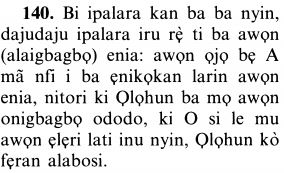3vs140
Select any filter and click on Go! to see results
إِن يَمْسَسْكُمْ قَرْحٌ فَقَدْ مَسَّ الْقَوْمَ قَرْحٌ مِّثْلُهُ وَتِلْكَ الأيَّامُ نُدَاوِلُهَا بَيْنَ النَّاسِ وَلِيَعْلَمَ اللّهُ الَّذِينَ آمَنُواْ وَيَتَّخِذَ مِنكُمْ شُهَدَاء وَاللّهُ لاَ يُحِبُّ الظَّالِمِينَ
In yamsaskum qarhun faqad massa alqawma qarhun mithluhu watilka alayyamu nudawiluha bayna alnnasi waliyaAAlama Allahu allatheena amanoo wayattakhitha minkum shuhadaa waAllahu la yuhibbu alththalimeena
Index Terms
Click to play
Yoruba Translation

Hausa Translation
Idan wani mĩki ya shãfe ku, to, lalle ne, wani mĩki kamarsa ya shãfi mutãnen, kuma waɗancan kwãnaki Muna sarrafa su a tsakãnin mutãne dõmin Allah Ya san waɗanda suka yi ĩmãni kuma Ya sãmi mãsu shahãda daga gare ku. Kuma Allah ba Ya son azzãlumai.
Asbabu n-Nuzuul (Occasions of Revelation)
(If ye have received a blow, the (disbelieving) people have received a blow the like thereof) [3:140]. Said Rashid ibn Sad: モWhen the Messenger of Allah, Allah bless him and give him peace, returned from Uhud, sad and dejected, women whose husbands and sons were killed went to him crying and slapping their faces.
Seeing this, the Messenger of Allah, Allah bless him and give him peace, exclaimed: Is this how Your Messenger is treated? And Allah, exalted is He, revealed this verse (If ye have received a blow, the (disbelieving) people have received a blow the like thereof)ヤ.
إِن يَمْسَسْكُمْ قَرْحٌ فَقَدْ مَسَّ الْقَوْمَ قَرْحٌ مِّثْلُهُ ...
If a wound has touched you, be sure a similar wound has touched the others,
Therefore, the Ayah says, if you suffered injuries and some of you were killed, then your enemies also suffered injuries and fatalities.
... وَتِلْكَ الأيَّامُ نُدَاوِلُهَا بَيْنَ النَّاسِ ...
And so are the days, that We give to men by turns,
and at times -- out of wisdom -- We allow the enemy to overcome you, although the final good end will be yours.
... وَلِيَعْلَمَ اللّهُ الَّذِينَ آمَنُواْ ...
and that Allah may know (test) those who believe,
According to Ibn Abbas,
meaning, "So that We find out who would be patient while fighting the enemies.''
... وَيَتَّخِذَ مِنكُمْ شُهَدَاء ...
and that He may take martyrs from among you.
those who would be killed in Allah's cause and gladly offer their lives seeking His pleasure.
... وَاللّهُ لاَ يُحِبُّ الظَّالِمِينَ ﴿١٤٠﴾
أي نديل عليكم الأعداء تارة وإن كانت لكم العاقبة لما لنا في ذلك من الحكمة ولهذا قال تعالى " وليعلم الله الذين آمنوا " قال ابن عباس : في مثل هذا لنرى من يصبر على مناجزة الأعداء " ويتخذ منكم شهداء " يعني يقتلون في سبيله ويبذلون مهجهم في مرضاته.
"إن يمسسكم" يصبكم بأحد "قرح" بفتح القاف وضمها جهد من جرح ونحوه "فقد مس القوم" الكفار "قرح مثله" ببدر "وتلك الأيام نداولها" نصرفها "بين الناس" يوما لفرقة ويوما لأخرى ليتعظوا "وليعلم الله" علم ظهور "الذين آمنوا" أخلصوا في إيمانهم من غيرهم "ويتخذ منكم شهداء" يكرمهم بالشهادة "والله لا يحب الظالمين" الكافرين أي يعاقبهم وما ينعم به عليهم استدراج
القرح الجرح . والضم والفتح فيه لغتان عن الكسائي والأخفش ; مثل عقر وعقر . الفراء : هو بالفتح الجرح , وبالضم ألمه . والمعنى : إن يمسسكم يوم أحد قرح فقد مس القوم يوم بدر قرح مثله . وقرأ محمد بن السميقع " قرح " بفتح القاف والراء على المصدر .
I'raab - grammatical analysis of the Qur'an
«إِنْ يَمْسَسْكُمْ قَرْحٌ» إن الشرطية والفعل المضارع فعل الشرط وقرح فاعله والجملة مستأنفة.
«فَقَدْ مَسَّ الْقَوْمَ قَرْحٌ» قد للتحقيق مس القوم فعل ماض ومفعوله وفاعله مؤخر والجملة معطوفة بالفاء.
«مِثْلُهُ» صفة قرح وجواب الشرط محذوف تقديره : فلا تيأسوا.
«وَتِلْكَ» الواو استئنافية تلك اسم إشارة مبتدأ.
«الْأَيَّامُ» بدل.
«نُداوِلُها بَيْنَ النَّاسِ» فعل مضارع ومفعوله والفاعل مستتر بين ظرف تعلق بالفعل الناس مضاف إليه والجملة خبر المبتدأ وجملة تلك الأيام استئنافية.
«وَلِيَعْلَمَ» الواو عاطفة اللام لام التعليل يعلم مضارع منصوب بأن المضمرة بعد لام التعليل.
«اللَّهُ» لفظ الجلالة فاعل.
«الَّذِينَ» اسم موصول مفعول به وجملة «آمَنُوا» صلة الموصول.
«وَيَتَّخِذَ» عطف على ليعلم.
«مِنْكُمْ» متعلقان بيتخذ.
«شُهَداءَ» مفعول به.
«وَاللَّهُ لا يُحِبُّ الظَّالِمِينَ» اللّه لفظ الجلالة مبتدأ وجملة لا يحب الظالمين خبره وجملة : واللّه لا يحب مستأنفة أو تعليلية أو اعتراضية.
